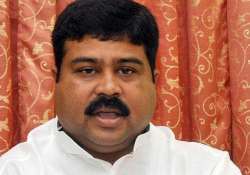Time has come for stopping LPG subsidy to well-off: Dharmendra Pradhan
New Delhi: Oil Minister Dharmendra Pradhan today hinted of stopping supply of subsidised cooking gas (LPG) to the well-off as only 42.5 lakh out of nearly 15 crore cooking gas consumers have so far voluntarily

New Delhi: Oil Minister Dharmendra Pradhan today hinted of stopping supply of subsidised cooking gas (LPG) to the well-off as only 42.5 lakh out of nearly 15 crore cooking gas consumers have so far voluntarily give up subsidy.
“Its time to decide whether persons beyond a certain income level should not be given the subsidy. Subsidies should be better targeted so that they reach people who need it,” Pradhan said at the Delhi Economics Conclave here.
So far more than 42.5 lakh domestic LPG consumers have volunteered to give up their LPG subsidy. The subsidy surrendered is used to connect poor households with LPG connections and relieve them from cooking with firewood or biomass which leads to not only increased carbon emissions but adversely impacts on their health.
“I am also happy to inform you that so far about 25 lakh BPL households have been provided with LPG connectivity under this scheme,” he said.
When Finance Minister Arun Jaitley, who was also on the panel, asked if it was time that people beyond a certain income give up subsidy, Pradhan remarked that time has come to decide if people above a certain income level should not be given subsidised LPG.
While a subsidised LPG cylinder of 14.2-kg costs Rs 417.82 in Delhi, a non-subsidised or market priced bottle costs 545.
A household is entitled to get 12 cylinders of 14.2-kg each or 34 bottles of 5-kg each at subsidised rate in a year. Any requirement beyond this quantity has to be bought at market price.
Pradhan said the government was also working on how to streamline the kerosene subsidy. “We have called the states for discussion... we will soon bring DBT in kerosene. With that Rs 4000-5000 crore subsidy reduction can take place.”
Government transfer LPG subsidy—the difference between the subsidised price and the market rate—to users directly in their bank accounts. Consumers use this cash to buy LPG at market rate from their local distributors. This Direct Benefit Transfer (DBT) scheme is now being planned for kerosene, he said.